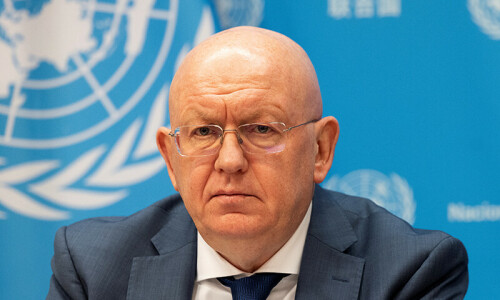The Taliban government praised on Wednesday the “spirit of cooperation” towards Afghanistan in UN-led talks that excluded women from the country.
Two days of meetings on Afghanistan ended in Doha on Monday, marking the first time Taliban authorities were included in the talks attended by United Nations officials and international special envoys.
Rights groups strongly criticised the UN decision to exclude civil society groups from the main meetings, in a compromise made to encourage the Taliban government’s participation.
Foreign officials “had a good spirit of cooperation vis-a-vis Afghanistan and we could see that their policies for Afghanistan have positively changed”, Taliban government spokesman Zabihullah Mujahid told a news conference in Kabul.
“Afghanistan has come out of isolation” and “an atmosphere of trust has been created”, he added.
The Doha talks were the third since the Taliban surged back to power in 2021.
They were not invited to the first round and refused to attend the second, insisting on being the only Afghan representatives to the exclusion of civil society groups, including women’s organisations.
“As this meeting was organised as per Afghanistan’s demands and in consideration of our national interests, we were able to participate and to inform the world of our position,” Mujahid said.
The international community has wrestled with its approach to the Taliban since they returned to power, with no country officially recognising its government.
Some believe the Taliban government should be isolated until they wind back curbs on women and girls. Others argue engagement on other topics should be dialled up in a bid to build dialogue.
“We told the countries that Afghanistan’s internal issues — issues related to its people and women — are Afghanistan’s issues,” Mujahid said.
“It should not be used for countries to apply political pressure.”
This round of Doha talks centred on efforts to bolster Afghanistan’s private sector and support counter-narcotics work in a country that has historically been the largest producer of opium.
The process was launched to discuss increasing and coordinating engagement with Afghanistan.
The UN was criticised for only including civil society organisations, including women’s rights groups, at separate meetings the day after the official talks.
Rights groups warned that the sidelining of Afghan women would legitimise policies imposed by the Taliban authorities which the UN has characterised as “gender apartheid”.
But the European Union’s special envoy to Afghanistan, Tomas Niklasson, said making concessions to Taliban authorities allowed for “good discussion” with all parties in Doha.
“To have the opportunity to talk with the Taliban, and they came, and to talk with these individuals, civil society, private sector, and they came … I think this was worth it,” he told AFP on Tuesday.
Discuss prisoner exchange with US
Separately, Mujahid said wwo American prisoners were being held in custody in Afghanistan and an “exchange” for Afghans held in Guantanamo Bay had been discussed with the United States.
Mujahid did not name the US prisoners, but an American woman was among more than a dozen staff of an international non-governmental organisation (NGO) arrested by Taliban authorities last September and aid worker Ryan Corbett has been custody in since 2022.
“We should be able to free our citizens in [an] exchange, as American citizens are important for them (the United States), just as Afghans are important for us,” Mujahid told a press conference in Kabul.
He said discussions over a prisoner exchange were held with US representatives during talks in Qatar.
“Two American citizens are imprisoned in Afghanistan,” Mujahid told the press conference, adding that Afghan prisoners were also held in the US, including in the secretive prison in Cuba.
“We have had discussions on their release with them (the United States) before. Afghanistan’s conditions should be accepted,” he said.
An American woman was among at least 18 staff of NGO International Assistance Mission (IAM) detained on accusations of carrying out Christian missionary work.
The UN in June warned Corbett’s “life could be at risk” and called for Taliban authorities to give him “immediate access to medical treatment for his deteriorating health”.
Dozens of foreigners have been detained by the Taliban authorities since the group’s return to power in August 2021.
Many countries, including the US, warn against citizens travelling to Afghanistan, citing risks of wrongful detention, violence and kidnapping.
At least one Afghan prisoner remains in detention at Guantanamo Bay, Muhammad Rahim, whose family called for his release in November.
In February, two former prisoners held in Guantanamo Bay until 2017 were welcomed home to Afghanistan, more than 20 years after they were arrested.
Abdul Karim and Abdul Zahir had been transferred to Oman and held under house arrest until their release.
They were among hundreds of suspected militants captured by US forces and held in Guantanamo Bay.
US authorities faced accusations of torture and abuse against prisoners at the facility, where many were held without charge or the legal power to challenge their detention.
Most of the military prison’s inmates have been released over the years, including senior Taliban leaders.
The US government has said for years it is working to reduce the number of detainees and eventually shut down Guantanamo Bay, which lies on the island of Cuba but is under US jurisdiction.



































